Here’s what you missed on Glee: It was the best of times, it was the worst of times, it was the age of diversity, it was the age of minority bashing, it was the epoch of empowerment, it was the epoch of disenfranchisement, it was the season of “Rumor Has It,” it was the season of “Blurred Lines,” it was the spring of Santana Lopez, it was the winter of Will Schuester, we had everything before us, we’d already seen everything before us a hundred times, we were all taking a midnight train going anywhere, we were all running the other way.
The double-doozy of “2009” and “Dreams Come True” was a microcosm of everything that was really wonderful and really terrible about Glee‘s six-season run, on both a storytelling level and a show-running level. I laughed some hearty laughs and cried a lot of real, earned tears — but I also physically cringed, rolled my eyeballs out of my head, and yelled at least twice, and felt mostly underwhelmed when the curtain finally closed. I’m going to briefly recap what happened on the two-parter; you’re not here for a play-by-play of the end of this show. (If you are, you’re out of luck, because there was no real story.) And then I’m going to talk about the takeaway of Glee. Okay? Okay!
“2009”
“2009” takes us back to season one, when the world was a very different place for everyone, and most especially for Kurt Hummel and Rachel Berry. He hadn’t interned at Vogue, dazzled the staff and students of NYADA, married the love of his life, or even overcome his first infestation of bedbugs in Brooklyn. He was a closeted gay kid with no friends and no hope that it would ever get better than sewing his own clothes alone in his basement. She hadn’t moved to New York, landed a role on Broadway, starred in her own TV show, or felt the brutal emotional pummeling of losing the person you love the most in the world. She was an insecure over-achiever with a million dreams and absolutely no avenue for pursuing them.
Mercedes and Tina and Artie were there too, of course. Mercedes was doing just fine, thank you very much in her church choir. Tina was faking that stutter and hanging out at the “otherkin identity” lunch table. Artie was too, and he loved Tina. “2009” does what the pilot does; it brings those five and Finn together, except it digs deeper into the things we didn’t see back then.
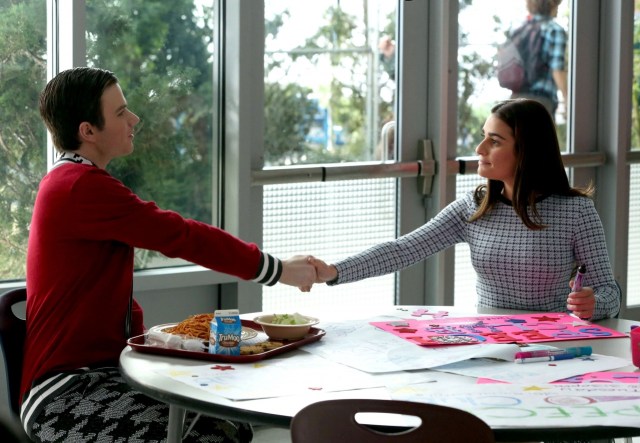
Kurt was getting bullied on the regular, yes; but he wasn’t just crawling out of the dumpster and dusting himself off. He was seriously considering killing himself. (Ending It All: Pros & Cons has to be Emma Pillsbury’s best-worst pamphlet idea ever.) He knew he was gay and the most moving moment of maybe this whole entire season is when little flashback Kurt stands in Burt’s garage and doesn’t have the courage to say out loud the thing he says in his head: “I’m gay, dad. Please don’t stop loving me, but I’m gay.” Burt is the one who told him to join a team, or else he was going to take away his sewing machine, and so after dueting with Rachel on “Popular” from Wicked — sentimental sob! — he decides New Directions is his way forward.
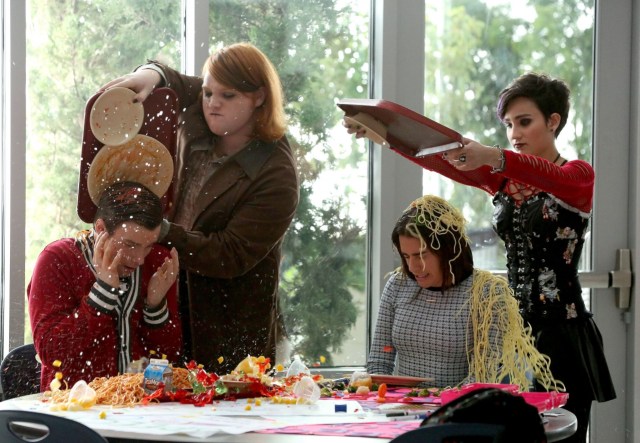
Mercedes and Rachel know right away that they’re going to be competing for every solo in the glee club. When Rachel sees Mercedes signing up for New Directions auditions, she follows her down the hallway talking a zillion words a second about: “It’s like my dad’s always say, the person who’s better than you — or, in this case, the person who’s almost as good as you — should be your best friend.” Rachel goes to Mercedes’ church to watch her blow the roof off the place singing “I’m His Child” with a full choir as her backup. They argue about who gets the solo in their first performance, but here’s a twist: Turns out Will gave it to Rachel because Terri told him to reward the person who was most pathetic.
Tina and Artie only audition for New Directions on a dare. Tina does a full rendition of “I Kissed a Girl” this time, and Artie brings it home, hilariously and amazingly, with “Pony.”
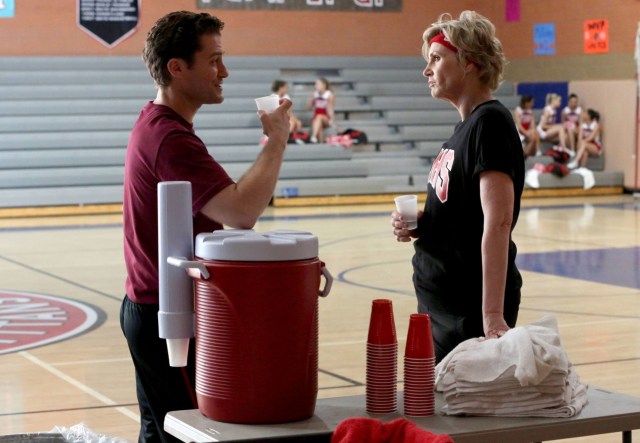
The trickiest thing about “2009,” obviously, was Finn. He was almost not even invited to New Directions; in fact, the club had a meeting without him to see if he should be able to stay. Yeah, he was a jock and a bully and his tagalongs like the Unholy Trinity would surely be following him, but — in an accidentally meta Murphy metaphor — the kids all say Finn only does inexplicably jerky stuff half the time, and anyway, he always follows it up with nice guy things. He wheeled Artie home the day the football team trapped him in that port-a-potty. He did let Kurt take off his Marc Jacobs jacket before tossing him in the dumpster. They decide to let him stay.
While the kids are sorting out their stuff, Sue finds out about glee club and whispers “How dare you” at Will in the most amazing way when he says the arts are just as important as cheerleading, and so that’s the beginning of their feud, even though they were Best Friends (who knew nothing about each other and only played basketball once a week) up to that point.
And so with their six-member dream team assembled, the New Directions perform “Don’t Stop Believin.’” It’s the scene from the pilot episode, with Cory Monteith and everything. I don’t know, man, if that part didn’t make you cry, you may want to check and make sure you’ve got a heartbeat.
One random thing I loved but other people seemed to hate: Blaine was in a coffee shop with Mercedes and Kurt in 2009! He handed Mercedes a sugar packet!
“Dreams Come True”
This wasn’t an episode of television as much as it was a epilogue slideshow of outrageous fortune. It’s basically just flash-forwards into the futures of the original New Directions (plus Blaine) and also Will and Sue. Santana and Brittany and Quinn are glaringly absent except for the curtain call, and I’m going to talk about that after these bullet points.
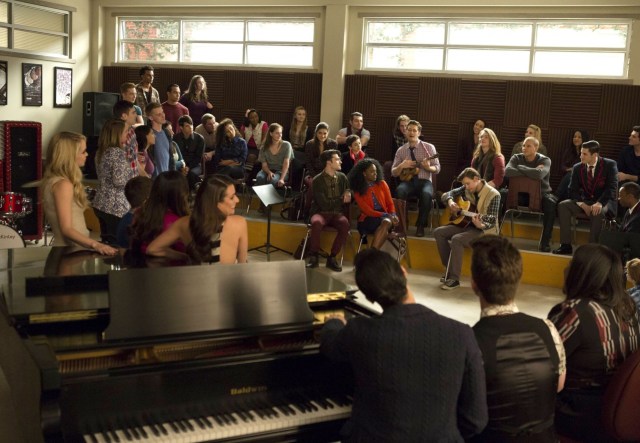
+ McKinley High becomes a performing arts school and Will becomes the principal and there are four glee clubs and everyone honors him for being the real hero of the show. (Put a pin in this; we’re coming back to it.) And Sam becomes New Directions’ new leader.
+ Sue finds her calling as Jeb Bush’s two-term vice-president and Becky becomes her Secret Service detail. The two reunite in a slow-mo rom-com style hallway run when Sue apologizes and tells Becky, “I’ve been treating you like an unpaid intern when I should have been treating you like a paid intern!”
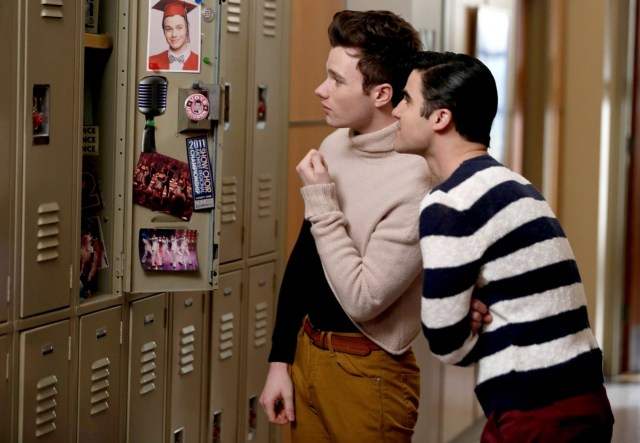
+ Blaine and Kurt perform at an elementary school for othered kids with the craziest suits and hair you have ever seen in a flash-forward in your life. Crazier than Ginny Weasley’s hair in Harry Potter and the Deathly Hallows. They’s super successful Broadway guys in their future too.
+ Mercedes sells a bazillion records and so Beyonce asks her to open for her world tour.
+ Artie and Tina get back together and one of Artie’s films makes it into the Slamdance Film Festival.
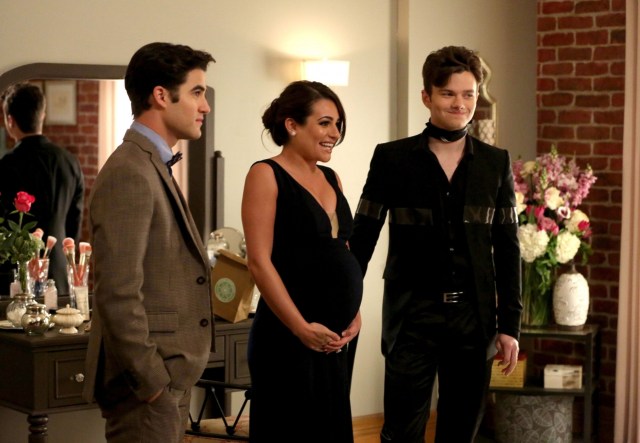
+ Rachel wins a Tony award, becomes the surrogate for Kurt and Blaine’s baby (“Obviously there’s a full circle story based on the way I was raised”) and marries Jessie St. James. The main person she thanks in her Tony acceptance speech — she beat out Maggie Smith, Willow Smith, and Anne Hathaway, by the way — is Will Schuester.
+ And then everyone comes back to honor Will and to dedicate the auditorium at McKinley High to Finn Hudson. Sue gives a pretty great speech about how being idealistic is actually super brave, and that’s not a thing she thought when New Directions first came into her life, but now she knows it’s true. There’s one final musical number and it’s “I Lived” and it’s a pretty great tribute to the hopefulness this show infused in its audience when it was at its very best.
Riese and Mey and I wrote about the nine really wonderful and revolutionary things that Glee accomplished while it was in the air. Riese wrote a beautiful thing about the cultural significance of Glee in her very last recap. And I have written repeatedly this year about how Brittana fandom changed everything for everyone about advocating for authentic queer female representation on TV. But there are a couple of really important things I think we should talk about before we put Glee to bed, and this last episode gives me a reason to do it.
Do you remember on Election Night in 2012 when Fox News was realizing that President Obama had destroyed Mitt Romney and they were flipping out, and whichever blonde-haired lady was on the air at the time, she said to Bill O’Reilly, “How is this happening?” And Bill O’Reilly said these exact words: “It’s not a traditional America anymore. The white establishment is now the minority. You’re going to see a tremendous hispanic vote for President Obama, overwhelming black vote for President Obama, and women will probably break President Obama’s way.”
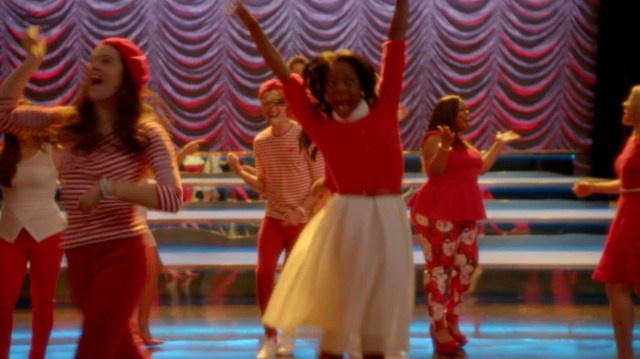
He said it like it was the worst thing he had ever realized in his entire life, that straight white dudes, basically, could no longer have whatever they wanted and do whatever they wanted just by nature of being straight white dudes. That the culture of oppression and exploitation of minorities that has been the modus operandi of straight white dudes in the United States for literally ever was suddenly being checked by people of color and by women and by gay people. Like it was the most colossal fucking tragedy he’d ever heard of in his life.
Weirdly, I think Glee struggled to come to terms with that reality Bill O’Reilly was freaking out about more than any show on TV. It’s not that Glee was guilty of being about white establishment culture more than other shows; it’s just that Glee‘s creators — to their tremendous credit — invited all kinds of minorities to the party, but then found themselves absolutely bamboozled and infuriated when those minorities refused to take whatever racist or sexist or transmisogynistic or homophobic wankshite was hurled their way. You can see it in the interviews the producers have given over the years, in their social media interactions with fans, in their in-show commentary about out-of-show critics.
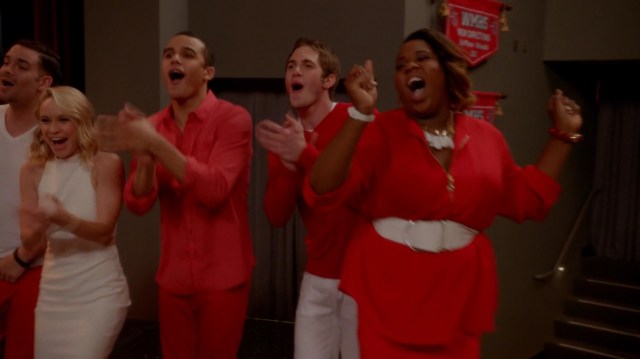
Glee is going to be remembered as a show about gay kids, but it was conceived as a show about two straight white men: The hero teacher and the high school quarterback. And of course it was. Fox would never have picked it up otherwise. It was meant to be Troy Bolton’s episodic adventures for the broadcast network set. And so the creators and writers were very obviously floored when it became clear early on that people were either ambivalent about Will Schuester or thoroughly annoyed at his (and by extension, Finn’s) white knight shenanigans.
Glee’s viewers wanted way less Will and way more Santana and Brittany and Quinn and Mercedes; way less straight white dudes swooping in to save the day and way more women working through complicated issues on their own; way less white establishment stories and way more underutilized minority character stories.
Feminist frustration reached its tipping point when Finn outed Santana and then made her sit through an entire episode of men singing songs at her about how they were cool with her being a lesbian.
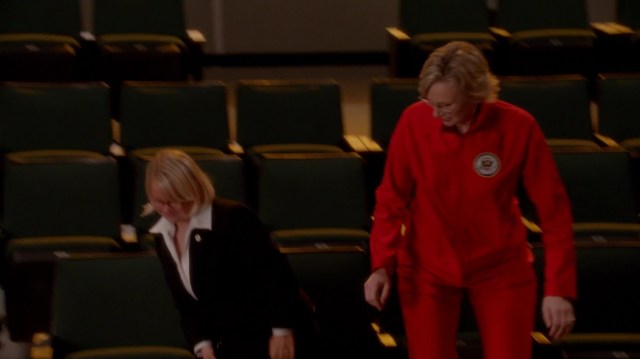
The writers could have reevaluated at that point. They could have gone, “Hmm. Maybe our viewers care more about seeing the story of the Latina lesbian working out her sexuality stuff and triumphing over adversity on her own than the story of the straight white quarterback being a hero to the gays. Maybe they care more about seeing a woman with OCD wrestle with that and learn to manage it than they do about seeing the straight white teacher ‘fix’ her. Maybe they care more about seeing the star of this show fight her own battles and emerge victorious than having the men in her life rob her of her autonomy repeatedly and set her feet on the right path, as determined by them.”
Instead, the writers antagonized viewers inside the show by having Tina say “Hashtag Glee hates women.” And Brittany call out the “Lesbian Blogger Community.” And any time they were questioned about it in real life, their answers were flippant and annoyed.
In a very strange way, it’s like Bill O’Reilly and Ryan Murphy shared a nightmare.
To be fair, I think this final season was a pretty big apology tour for Glee. Mercedes pushed Rachel back to New York, for example. It was Unique and a whole trans choir who reached out to Coach Beiste. All the gay couples got married. But it was too little, too late, and Will being such an enormous focus of the final episode — at one point, half the cast stares at him adoringly with their heads in their hands while he sings “Teach Your Children” with his ukulele — it’s pretty clear that the pleas of viewers never really sank in.
Find me one person who would rather have seen a celebration of Will Schuester over a celebration of Santana or Brittany or Quinn. Seriously, one person. You can search for a hundred years and never find such a human. They do not exist. That Quinn was never even mentioned in the context of Santana and Brittany’s wedding, and that the three of them only appeared for a nanosecond in the finale is one of the top five stupidest things Glee did over the course of six whole seasons. Will was only ever a hero to these writers.
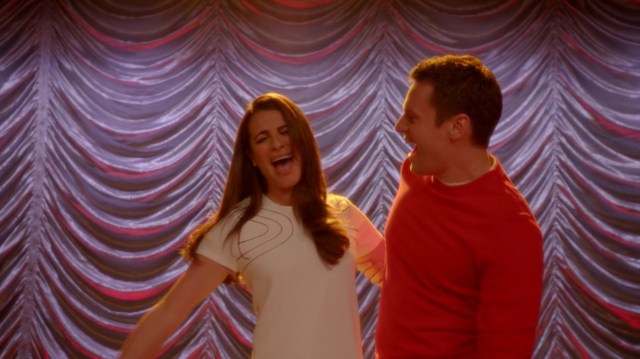
But now here’s an amazing thing: At the end, the end didn’t even matter. I watched the final episode of Glee with two of my best friends. We laughed and we cried and we got drunk on Faberry cocktails and stayed up half the night talking about TV and true love and whether you should have as much sex as you want or get caught up on all your work deadlines first if you get your hands on a Time-Turner. I go to these two women when I need a giggle and when I need a shoulder to rest my weary head on. And I wouldn’t have met either of them if it hadn’t been for Glee.
And I know you have that too. I know it because you told me, in person and over email and on Tumblr and Twitter and in all those fan fiction questionnaires. You said Brittany and Santana and Rachel and Quinn and Rachel and Unique and Mercedes changed what you hoped for and how you felt like you deserved to be treated and you found safe online spaces to celebrate that brand new feeling.
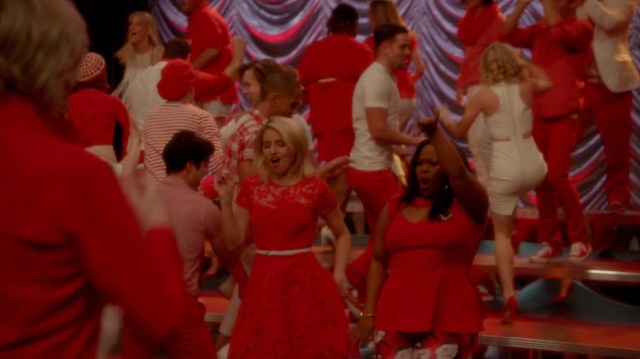
Before the episode started, I asked if my friends remembered where they were when the pilot premiered, and they both said yes. And we all agreed that was super weird, because none of us could remember where we were when we watched the pilot of any other show. It’s like how you’re not actively trying to remember every detail of your first date with someone you’ll fall in love with, but 20 years later, you can still relay every detail. The things Glee got right, it got so right, in a way no show had gotten right before. In a twist of ultimate irony, Glee made us so brave, as individuals, and so strong, as a community, that we found the strength and courage to demand that it treat us right. Glee hated us a lot of the time, but it formed us in the fire of its own hopeful crucible!
The legacy of Glee isn’t this finale. The legacy of Glee is on our iPods; and in our richly rewarding fandom communities; and in our hearts. It’s also in the avalanche of real-life marriage equality and the end of DOMA and DADT and in the growing body of anti-discrimination legislation that’s being passed here in America. None of those things would be a reality if public opinion hadn’t shifted toward gay people, and public opinion would have never, ever shifted toward gay people if Glee hadn’t started this queer revolution on broadcast TV.
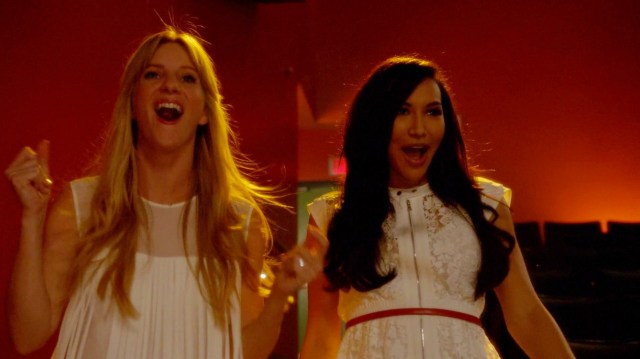
So much has changed since Glee premiered, and in so many exciting ways. And it’s just going to keep on getting better.
We don’t need anyone to tell us what happened with Santana and Brittany and Quinn and Unique. We already know. We’ve known them better than the writers all along.
Santana Lopez is one of my top five favorite things to happen on TV, and the reverberations of her remarkable relationship with Brittany will echo around the internet until Tara Maclay descends from heaven to take us all home. I’ll miss those two a whole awful lot. But I won’t miss you, because we’re in each other’s lives forever now. The best gift Glee gave us was each other.
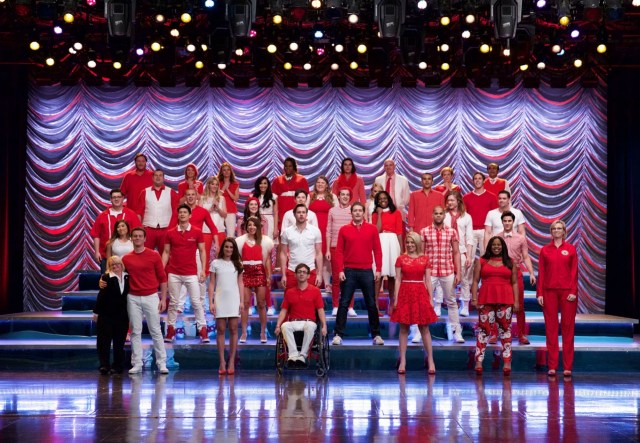
Glee punched our ticket to the midnight train, but we’re the ones who’ll go on, and on, and on.








Comments
“Find me one person who would rather have seen a celebration of Will Schuester over a celebration of Santana or Brittany or Quinn. Seriously, one person. You can search for a hundred years and never find such a human. They do not exist.”
Actually, they do. I’m one of them.
I’m a queer girl and I honestly don’t give a fuck about Quinn or Brittany. Santana, yes, but she already got way too much (boring, because it was all with Brittany) screentime this season, so I was actually quite glad she was only in the finale for two seconds.
I agree. I always tried to force myself to care about Brittany, Santana and Quinn because it seemed that they were the people who I was supposed to identify with because I’m a not-so-straight girl. But I could never identify with them. I identified with most of the guys more, and even though I thought some of the Will plots in S1 were seriously unneeded I started craving more about Will and just any character that reflected real life. I cared about Will in the end, I cared about Emma and Rachel and Jesse, because they seemed like the most real characters to me. When I started watching the show I identified with Kurt the most, but the writers ruined him by pandering to fandom.
In the end I think fandom is what killed this show. It’s okay for people to say that only the die-hard fans were watching at the end, but the fact is if the writers hadn’t had so much fan involvement (I think it was probably difficult for them to adjust to a world where social media and therefore interaction between creators and audiences were exploding) they might have focussed on fewer characters and told the stories that they always wanted to tell. Glee ended up pandering to too many fans of too many characters and no one could accept that the show belonged to the writers so they kept pressuring and causing a fuss and in the end the fandom was the worst thing ever to happen to Glee.
my husband is a will schuester. better than will, in fact. it’s a shame you’ve never run into one of them.
Also, in reference to the whole “this show was conceived to be about two white men” point, please, really? Rachel Berry was always supposed to be the clear star of this show, from the very beginning. Yes, Finn and Mr. Schue were pegged as the other leads, but Rachel was the only character who was given lead screentime and lead storylines in almost every single episode of Season 1.
I agree Rachel was always one of the lead and Lea was the break out star of the show but sadly they didn’t let Rachel always stay true to who she was and why she was so loved or even so hated. Rachel had to have the boy help make her a better person because you know being a strong ambitious young woman is wrong.
Oh thank god, i thought i was the only one flipping my shit over the fact that half an episode was dedicated to that curly-haired creeper. He somehow got more screen time than Quinn? Fuck no.
I cried so much at this finale :””(
Heather! reading this made me smile and shout and throw my hands up in frustrated agreement and most of all cry. Everything you said is exactly how I felt about the finale!
To be honest, I didn’t watch Glee until the episode after Brittany said that if sex were dating, she and Santana would be dating. The minute I found out that there was a queer Latina character on the show I immediately started watching. Seriously, Santana was such an important character to me, and I know she was to a ton of other people too. I was literally yelling at my TV when I realized that she wasn’t going to get any time in the finale. She was such a huge and vital part of the show and it felt like a stab in the back to leave her out. Quinn and Brittany too. Ugh, I’m getting mad and sad right now just thinking about it.
Also, I don’t know if this is a popular idea in the fandom, but it really warmed my heart to see that Rachel and Jessie St. James got married?
And seriously, I couldn’t care less about Will Schuester.
I was also totally in for Rachel and Jessie St. James. :) I mean, they were destined to be together, you know?
I kept exclaiming, “Go away, Will! Nobody cares!” during the finale. It was the Will Schuester tribute show and I was so over it.
Everything you said here resonates! I remember watching the pilot episode of Glee, which I really only came to because we’re musical theatre dorks and I knew that would be part of it. I remember after, turning to Waffle and being like, “What did we just watch? What is this? Is this really on TV?” And then when it became super popular, it was just incredible. This show with this diverse cast with grand musical numbers. This was really real? And younger folks were watching this? On their TV? What was this world?
You and Riese have done such a bang-up job recapping and, more importantly, giving context to this show that I loved and then grew to hate. Like a bad break-up. The one where you stay for far too long and when you finally leave each other, you literally can’t stand each other for one more second. And then one day, years later, you run into each other at the grocery store and you realize you don’t feel anything for them anymore, but all those memories come flooding back anyway. That is how I felt watching this finale.
Aaaanyway, goodbye Glee. Thanks for trying. And thanks for this recap/commentary/essay/feelingspizza thing, Heather. You got it all right.
Just a small correction – Tina was the one who made the “hashtag glee hates girls” comment.
It’s odd. Get a group of Glee watchers together and you’ll likely hear “Glee was really about a, b, c, d all along.” (choose one) Each person can be right, too, since Glee’s greatest strength and worst fault was being about everything and nothing at the same time. I think the creators originally intended it to be about the grown-ups, Will and Sue, with the kids being expendable and replaceable. I never cared about the grown-ups. In fact, I only cared about Brittana and had no use for anything else. I was always in awe of the talent of some of the cast but did not care about their characters. That makes it easier to say goodbye as I have been gone since the end of season 3.
I’m sure this will be an unpopular thing to say: but Brittana seem like such an unrealistic lesbian couple to cling to from lesbian representation on television. In those early seasons, their story lines were all over the place and even by “tidying” it up with a wedding, I never felt connected to them as a couple. I feel like they were always an after thought to the gay men and their characterisations were washy most of the time. The fact that they couldn’t even get a proper kiss in there (despite so much man macking) and also I felt the gay man distaste towards them was evident in their representation.
I honestly felt the same about Brittana. I was able to relate to their story in specific moments, like Santana coming out, but for the most part, seen as the relationship was never meant to happen, it seemed evident to me that no one was actually putting any effort to make it consistent or believable, or at least, at times, not incredibly ridiculous. Santana and Brittany had better scenes almost with everyone and everything than with each other, their dialogue was sterile and almost like they didn’t believe what they were saying either. It only got better this season, which makes sense since the whole thing has been a big apology to almost every single part of the fandom.
I don’t think Heather Morris is as strong an actor as she is a dancer. I think the writers didn’t give her many lines in the beginning because of this and maybe that is why they were so hesitant to flesh out a proper storyline for Brittana.
It doesn’t excuse the writers though, they should have had a queer woman storyline from the beginning, if they hadn’t planned it for Brittany & Santana.
Thanks for articulating this, I totally agree!
It really disappoints me how many fans seem to think it has to be a competition between the gay men and the lesbians. As a lesbian ,I dont only want lesbian representation.I want gay male representation aswell. It shouldn’t be either/or. Also, the notion that the males got to kiss each other all the time is clearly false. The hetero couples on glee always kissed more and for longer and that is a problem. It makes me sad when people fight over who gets better representation out of gay men and women. Both need a hell of a lot more and better and in some ways it is better for each. Look at the uproar over the male character on Black Sails and a gay kiss on the walking dead. On the other hand “lesbians” are often used as tittilation and nothing more. Both things need changing. For someone to suggest glee revolved around Klaine and that is a regular things with gay men is just not true. Instead of comparing screen time and kisses for lesbian and gay couples, let’s fight for them both to get more.
I agree completely with you. Perhaps I didn’t express that sentiment strongly enough in my original comment.
I also want gay man representation and actively watch tv shows expressing that – Looking, Cucumber to name a specific few. I’m not saying they should cut the gay man action to make way for lesbian action, but there should be more better (yes I went there) lesbian action. Is there a lesbian equivalent on TV or in production to shows like HBO looking or UK Cucumber ?
I love the final reflection on what Glee has brought to us, and I agree with you Heather, I think the best thing about it (apart from kickstarting better representation in media) is the fandom that originated from it. Personally I was never able to get into Brittana, I just never found them believable, but for some reason Faberry caught my eye and those days when there seemed to be endless fanfics to read were the best. And even though Faberry itself was just a fantasy, it made watching the trainwreck that Glee was interesting for a minute, just to see what new scene were they going to get and how many fanfics were going to derivate from it.
And the music, which oftentimes was awesome. And the guest stars. And Santana’s rants and Rachel saying “I need applause to live”, and Sue getting out of her office throwing things around and pushing students. Things like that made Glee quirky and special in its own way. I’m not going to miss watching it but I guess those will be the things I’ll remember from it, if that makes sense.
I don’t think they were trying to make the final episode about Will, but rather they needed something to happen to Will to justify all of the old Glee club members being in the same place at the same time. He was just the common link.
I loved the finale. I cried like a baby during both episodes. I loved where the characters futures are going. I thought it was great. Yeah, more Santana and Brittany and Quinn would have been nice, but I’ll take what I can get.
Dianna said that she really wasn’t sure if she would be able to be in the finale at all because she’s currently filming in Europe. It wouldn’t surprise me if she was only available to film for the one scene anyway. She made it sound like her schedule was really tight. I’m thankful she was there at all. It doesn’t explain Brittany and Santana, but for all we know it could have been a contractual thing since they’re all guest stars and not regular cast. Or maybe it was simply that they didn’t have time to write them in. Who knows.
One of my favourite parts was when McKinley became an arts school. Aside from the message of acceptance, one of the main messages since the show began was that the arts matter. It warmed my heart so much that every kid in the greater Lima area has an arts school to go to. That was really special.
(And people hated the Blaine cameo in 2009? Why? I thought it was hilarious! It was only like 10 seconds so it’s not like it took away from anything. Why the hate?)
Why the hate becasue the Blaine cameo was once again pandering to the Klaine fans. Darren was not written in the script and Klainers got word of that and pissed and moaned so they cut something to add that unnesscary moment.
I don’t know about “Klainers” trying to get him in there. But I still don’t see the problem. Maybe it’s because Klaine is one of my OTP’s, but I thought it was clever and funny. And sure it was unnecessary, but it was also super short and whatever they had to cut would probably have just been like 10 extra seconds of Mercedes and Kurt talking about Finn.
Even with all of it’s flaws, I’m glad Glee was around to show a diverse crowd of queer characters, and not just one token gay character. I wish it had been on the air when I was in high school, because seeing girls like Brittany and Santana on TV really would have made a difference to me.
That being said, Sam and Blaine were still my favorite characters throughout the series. Blaine’s ending was predicable, but I liked what they did with Sam.
I love your commentary on this Heather!
Did anyone roll their eyes when Rachel became a surrogate for Kurt & Blaine? Like really??? She’s going to pause her budding career after only 5 years to have their baby? The world always revolves around gay men’s stories on this show. I love Klaine to bits, but this was totally unrealistic.
Yes! I agree completely! it’s like you so easily gave up her career for that time, and will give up her baby (or is someone else the mother?) for the gay men to have the idyllic last word. not that gay men don’t deserve to have it every now and then, but seems all to common.
I thought that too! It felt very out of character for someone as ambitious as Rachel. I guess winning a Tony was her big dream, so she could retire and become a babymaker for Klaine and Jesse St. James? Cool.
Whether or not Rachel offering to be a surrogate was OOC is certainly a valid opinion, but I dislike the implication that she was simply becoming a babymaker. Monique, there was no indication that she was retiring from Broadway. Her choosing to have kids, especially with her own husband, does not make her less successful. Many Broadway actresses have kids.
Yeah there is NO WAY that a working Broadway actress would be a surrogate. Seriously, zero chance. Would never happen. Not ever.
Something that I think is interesting…. after Cory Monteith died, I remember reading how the ending was going to have to change (obviously). Apparently, Ryan Murphy’s original idea was that Rachel makes it big on Broadway but decides her life is meaningless without Finn so leaves to go back to Ohio where Finn is a teacher and the last line was her saying “I’m home.” Now that Finn is not in the picture, Rachel goes on to be a Broadway star and win a Tony instead. So… there’s that.
I think it was less that her life was meaningless Finn, it was just despite success and fame it wasn’t the same without him. I read it more as like she does everything she wants to do as an actress (win a Tony, star in a movie, etc) before deciding she’s ready to slow down and be with him.
But I guess we’ll never know now.
Oh got ya. Yeah, it could be that way. I was thinking more like… man in her life = give up dreams. Man not in her life = achieve greatness. But you are probably right. :)
KURT’S HAIR. KURT’S HAIR. MY GOD, WHO PUT THAT AWFUL PART IN KURT’S HAIR?!
Brittana and Santana Lopez are my two favorite things to happen on my TV. I agree with Heather, I was never interested in Will Schuster’s character, he always took screen time away from the kids. I felt like instead of the kids being replaceable background to him, it should have been the other way around. My whole issue with Glee was always the men taking the power from the women. I was screaming at the TV when Sam was mansplaining to Rachel a few episodes back about what she should choose in NY.
I’ve always had to remind myself that this show reflects a gay white man’s perspective. He is in love with Lea (a great Broadway voice) and Darren and we get to see that constantly. I think Kurt may have been a portrayal of himself in high school, but Brittana was never his idea. There has been much written about how Quinn was supposed to be a Regina George, but she made the character more human and relatable than Ryan ever intended. These women were a mystery to the show runners. They were supposed to be two dimensional background characters. The audience was demanding follow-up to a story they never intended to write. Rachel, Finn, and Will were all intertwined in the main story, but the train went off the tracks. For the most part after that the writers were just hanging on for dear life.
In a perfect world, Glee could have shown us more female agency, but you have to understand something to write it. So instead, I’m going to be grateful for “The Wedding” which is a much happier ending than I ever expected, and as Heather said, the true gift of Glee is each other.
Totally agree with this. I’d only add that, sadly, I think the show (and plot) became not much more than a vehicle for pumping out songs to sell and make money. That is, the original creative team wasn’t all that invested in it past the first season or two. They’d trow in ‘issue of the week’ storylines but never really have any intention of following up or providing character and plot continuity.
You nailed it so hard in this recap, and made me laugh so much. I agree with everything you said about Will and straight white men and all the tokens they threw in there and then wondered when their cookies would arrive. And what you said about us knowing what happens next to the characters we love better than they do — that is a good fucking point. I almost feel peaceful about it.
Everyone watch steven universe. You want progressive, heartwarming, hilarious, diverse show that advances gender issues 100000 years into the stratosphere? Watch Steven Universe. The titular character may be male, but he’s also the physical reincarnation of his revolutionary hero mother, who turned against her home planet to save the earth from colonisation and pillage. It’s about his family, consisting of a lovable deadbeat dad and his mother’s three war buddies who look after him and train him in his legacy while also defending the earth from the remanents of their homeworld. (All of whom are phenotypically female but also agender.) And steven may be a ‘white’ ‘dude’ (though that’s all debateble) but he is in awe of his mentors and deeply respects them; has an interracial romance with the most amazing nerd who of all the characters is the one th audience is most supposed to identify (a romance which they consolidate by fusing to become an genderless modern Adonis and tearing up the dancefloor while also dealing with the realities of anxiety and social phobia). It’s funny, it’s sweet, it has ORIGINAL music that you will find stuck in your head for months. It’s everything Glee never managed to be.
Oh… transmisogynistic, aka ‘it’s ok to be transphobic as long as it’s against transmen’. How disgusting of someone supposedly against discrimination. But then again, this site thinks Klaine, the single most fucked up relationship on the show, bar none, is great gay representation. Seriously?
Also, saying the show was supposed to be about two white guys when the creator have stating time and time again that RACHEL (a woman) was the main character of the show makes you sound quite insincere.